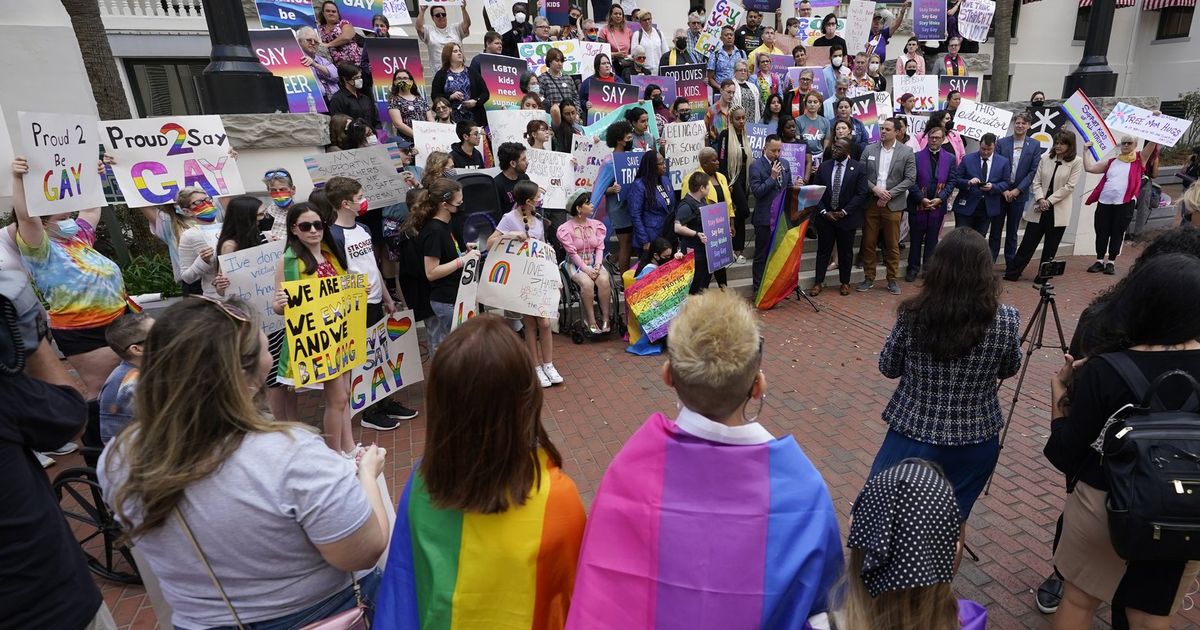Why you keep hearing the word ‘grooming’ in the news

If there was ever evidence that progress is not linear, it can be seen in sharp focus with the recent wave of anti-LGBTQ+ rhetoric and bills sweeping the country.
Even as support for once-controversial topics such a same-sex marriage is now up to 70% from 40% in the U.S. in 2005, the number of bills targeting the LGBTQ+ community is at an all-time high.
According to Bloomberg, Republicans nationwide have already proposed 325 anti-LGBTQ+ bills this year, exceeding what was a previous record of 268 last year. Of those, 130 of the bills targeted transgender people.
And it seems like overnight, the word “grooming” is everywhere.
It came up in the hearings for confirmed Supreme Court justice Ketanji Brown Jackson. The Florida so-called “Don’t Say Gay” bill was rebranded by the Florida governor’s press secretary as an “Anti-Grooming Bill.”
FOX News host Laura Ingraham, whose “The Ingraham Angle” is the sixth-most-watched show on cable news, joined the fray, asking when public schools became “grooming centers for gender identity radicals.”
A Vox headline about this moment read, “Old-school homophobia is back.” But a more accurate assessment is that it never left, it just now has new wind beneath its wings.
The “grooming” narrative plays into the oldest and most toxic tropes about LGBTQ+ people. It speciously links any discussion of gender or sexual orientation to LGBTQ+ predators, targeting children for deviant purposes. Anita Bryant, with her “Save Our Children” campaign in the late 1970s, laid the groundwork, arguing that LGBTQ+ people were “recruiting” kids. The narrative also offers a wink to believers of QAnon, for whom belief in a secret cabal of liberal pedophiles is core to their worldview.
I know some would call what we are experiencing now just another cynical battle in the “culture wars,” but to do so minimizes the very real-world harm these narratives create.
According to a poll released in January by The Trevor Project, an organization that supports LGBTQ+ youth in crisis, two-thirds of LGBTQ+ youth said debates about states restricting the rights of transgender people have negatively affected their mental health. For transgender and nonbinary youth, 85% said the same.
Mental health is already a dire issue for LGBTQ+ young people, particularly transgender young people, who are disproportionately targeted by legislation. A 2020 study found that 86% of transgender youth had considered suicide and 56% had attempted suicide. The Trevor Project reported that overall, LGBTQ+ youth are four times as likely to attempt suicide as their peers.
Critically, they noted that “LGBTQ youth are not inherently prone to suicide risk because of their sexual orientation or gender identity but rather placed at higher risk because of how they are mistreated and stigmatized in society.”
Washington, seen by some as a somewhat friendlier place for LGBTQ+ people compared with other states, is not immune to these issues.
In early February, Seattle Times reporter Daniel Beekman wrote about efforts to ban books on LGBTQ+ themes in Covington, stirring passionate debate over what is appropriate for young people to learn in school. The American Library Association reported a sharp increase in the number of books challenged in late 2021 and half of its most-challenged books of 2021 had LGBTQ+ themes.
Sure, this talk of “grooming” and anti-LGBTQ+ legislation might just be a political strategy to rally the conservative base ahead of the 2022 midterms. But the reason it’s happening doesn’t make it any less toxic or dangerous. The harm is real, even if the rhetoric is disingenuous at best.
To ensure we don’t lose the limited and tenuous progress we have gained, we need to challenge these narratives wherever they appear. There is nothing nefarious about teaching young people about the full range of human experience that they see around them and see in themselves. We also need to continue to address the health, legal and employment disparities that disproportionately impact LGBTQ+ people.
Through our actions, we need to show LGBTQ+ youth we are paying attention and we are not willing to let their lives become collateral damage in political battles waged by people who should know better.
This article has been archived for your research. The original version from The Seattle Times can be found here.


